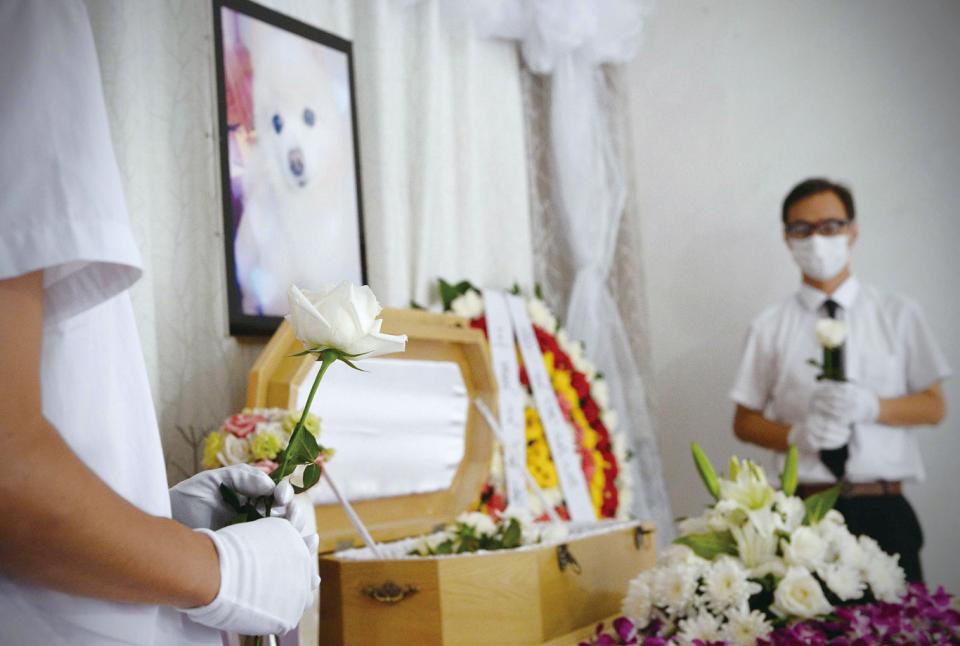In late 2014, Wu Tong began a start-up with a difference: funerals for pets. As her own dog (a nine-and-a-half-year-old cocker spaniel) advanced in age, she started to wonder what she would do when it passed away. As of this year, she has performed funerals for more than 2,000 pets.
Li Chao lost two pet dogs in late 2015, one to a viral infection and the other to complications from epilepsy. Li suffered greatly, and while mourning he decided to quit his job to found JoyPet, a company that offers pet cremation services.
Wu and Li both work as “pet embalmers,” an occupation rarely seen in China.
According to China’s 2017 Pet Industry White Paper, around 900 million cats and dogs are kept as pets in the country. Seventeen percent of families own pets. Often they are regarded as family members. As they enjoy increasingly prominent roles in people’s lives, demand for a decent send-off has grown.
Before each funeral, Li Chao carries the deceased pet to a mourning room. Laying the body on a table circled with flowers, he carefully cleans and combs the pet, wipes its ears, nose and mouth with tissues, and then cuts off a wisp of its hair as a keepsake for the owner.
A funeral in traditional Chinese style follows: the pet is clothed in red robes printed with Buddhist scriptures, and Buddhist chants play. Other mourners are invited to retreat, while the owner is allowed to stay and say a final farewell.
For Li and Wu, the job goes beyond embalming pets. They act as de facto counselors comforting mourning pet owners. Wu Tong takes the approach of discussing what the pet was like, and encouraging the owner to share their experiences. She shares their stories on her personal WeChat account as a record.
“One client had to go into work after losing his cat that morning. He broke down in tears, but his colleagues couldn’t empathize,” Wu explained. “But when he spoke to me, I could understand and share his pain.” This is why pet embalmers like Wu and Li have won the trust of their clients.
Wu Tong also tries to share information and articles through her WeChat blog to help pet owners deal with the sorrow caused by their dying pets. She recently translated an article from a Japanese website explaining palliative pet care, including how to feed sick pets who suffer from a terminal illness, and talk with the pets before euthanizing them, cremating or burying them. “Death is not the end, but the beginning of a new journey,” commented Wu.
For the first year Li Chao ran JoyPet, public misunderstanding toward the industry and the lack of regulation caused challenges.
Unlike in Europe, the US and Japan where animal funeral businesses are well-regulated with proper procedures and specially designated organizations are responsible for supervising animal cremation and burial, China has no regulation or legal principles on such matters, nor regulators.
The public often questions whether businesses like Li’s are exploitative, and profit-driven. He also faces pressure from his own family, since his mother is unable to understand why he resigned from a “proper job” to work instead with the dead bodies of animals.
Due to unfavorable government policies towards the business, both Li and Wu have been forced to move their company several times within the past year.
“It is really difficult for me to find a suitable place to run the business,” Li told NewsChina. Since there is no legal certificate for this emerging industry, the authorities simply tell him to move. So far, Wu has been forced to restrict the business to designing and producing cremation caskets only.
When she started her business, Wu showcased cremation casket designs for pets to more than 100 veterinary clinics in Beijing, but few customers were interested. Now, she says, the mood is shifting. She plans to create keepsakes with pets’ hair, baby teeth and more in the near future.
JoyPet has a more established business model and seven full-time employees. Li is providing innovative products and new services, including profile hand-painting, memorial diamonds and specimen-making. The specimen service takes 15 to 20 days and costs vary from a couple of hundred yuan to 10,000 yuan (US$1,500).
Wu Tong says she finds it hard to relate to people, but enjoys a deep connection with her dog, and she feels mutual trust and reliance from her pet toward her.
“Most of my clients feel the same way,” continued Wu. “They all have a positive relationship with their pets.”
Wu says over the past few years market demand has grown in the pet cremation business and providers of such services mushroomed in suburban Beijing.
For their part, Li Chao said pet funeral service providers are improving the quality of their services, making them more customer-oriented with better personalization and diversification.
The pet industry white paper found that pet cremation services form a small proportion, at 4.2 percent, of all pet services. Pet healthcare and pet beautification services occupy a far larger market share. And industry supervision remains scant, leaving no official guidelines about how to conduct a pet funeral.
But the private development of the industry continues despite the fact the government is missing in action.
Li Chao has reserved a room with cupboards to store pet ashes, photos and other keepsakes. Li plans to renovate the room and add artificial lawn, alongside small boxes for each deceased pet.
Wu Tong plans to work together with professional psychologists in the future, to conduct psychotherapy for those who cannot step out of the shadow of losing their beloved pets. “Maybe someday I will also need this assistance,” Wu added.

 Old Version
Old Version
